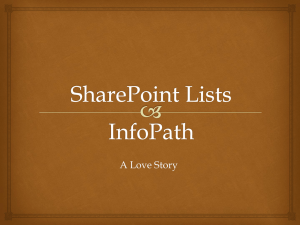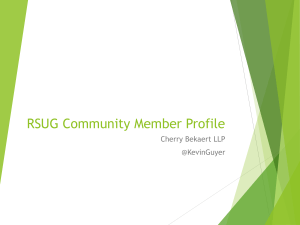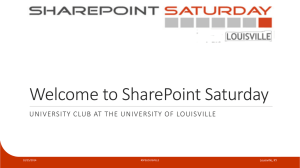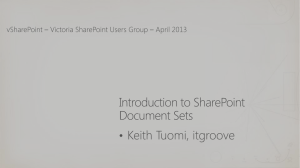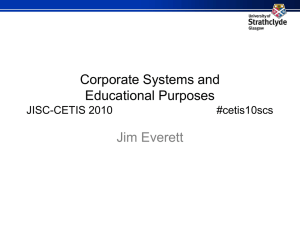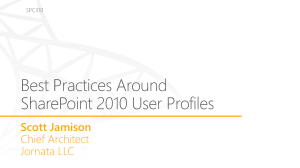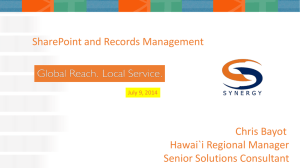SharePoint 2010 ECM - Minnesota SharePoint User Group
advertisement
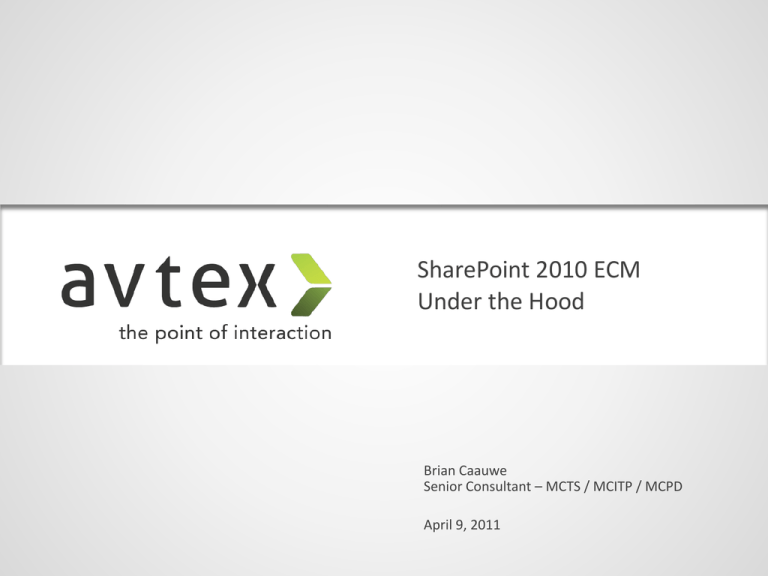
SharePoint 2010 ECM Under the Hood Brian Caauwe Senior Consultant – MCTS / MCITP / MCPD April 9, 2011 Session Agenda • • • • Document Management Term Management Web Content Management Records Management Who am I? • Brian Caauwe • Consultant & Speaker – Email: bcaauwe@avtex.com – Blog: http://blogs.avtex.com/blogs/bcaauwe • • • • MCTS – SharePoint v3 MCTS – SharePoint v4 MCITP – SharePoint 2010 MCPD – SharePoint 2010 Minnesota SharePoint User Group • 2nd Wednesday of the Month – 9:00 – 11:30 AM • • • • SharePoint resources and links Meeting Schedule Past User Group Presentations This Presentation www.sharepointmn.com • Next Meeting – 4/13 – Internet Sites built on SharePoint Quick Poll • Version – 2007 – WSS, MOSS – 2010 – SPF, Server, FAST • Work Roles – SharePoint Administrator – SharePoint Developer – Business User – Other Document Management Document Management • • • • • • Content Types Document Sets Management Policies Document ID Metadata Navigation Social Rating Document Management Content Types • Reusable definition – NOT just for documents • Settings – – – – – Workflows Templates Document Information Panel Document Conversion Policies (more on this later) • Inheritance – CAN NOT be reset Document Management Content Types – Continued • Metadata Columns – Types • • • • • • • • • • • • • Single line of text Multiple lines of text Choice Number Currency Date and Time Lookup Yes / No (Checkbox) Person or Group Hyperlink or Picture Calculated (based on other columns) External Data (connected to BCS) Managed Metadata (more on this later) – Site Column vs. List Column Document Management Content Types – Continued • Publishing – Syndication Hub • Managed Metadata service • Site Collection feature – Publishing Settings • Publishing • Unpublish • Republish – Error Log • Hidden List – Timer Jobs Document Management Document Sets • • • • • Special Content Type Shared metadata Default content Configure Welcome page Single entity • ONLY be used for documents • CAN NOT nest sets Document Management Management Policies • Retention (more on this later) • Auditing – – – – – Viewing Editing Check-in / Check-out Move / Copy Delete / Restore • Barcodes – Auto generation • Labels – Label formatting based on metadata values Document Management Document ID • Unique ID • Automatic assignment • Site Collection definition – Site collection prefix • Find by Document ID web part Document Management Metadata Navigation • List Settings – Navigation Hierarchies – Filters – Automatic Indexing Document Management Social Rating • List Settings – Number of Ratings – Rating (0-5) • Per user rating • Timer jobs – Social Data Maintenance Job – Social Rating Synchronization Job – Activity Feed Job • Populate news feed Document Management Demo Term Management Term Management • • • • Managed Metadata Service Managed Metadata Columns Tags Taxonomy / Folksonomy Term Management Managed Metadata Service • Service Application – Identify Content Type Syndication hub • Service Application Proxy – Limits • Only one per service application – Identify default storage location • • Enterprise Keywords Column Term Sets – Consume or Push-down Content Type publishing – Delegate Administration – Bulk import from .CSV (sample provided) • Term Group / Term Store – Limits • • Many per service application Up to 1,000,000 items / store – Delegate Managers and Contributors Term Management Managed Metadata Service – Continued • Term Set – Limits • Up to 1,000 / term store – – – – Contact (used for feedback link) Submission Policy Social Tagging Sorting • Term – Limits • Up to 30,000 / term set • Up to 7 nested levels – Labels / Synonyms – Social Tagging Term Management Managed Metadata Columns • New column type – Better than “Choice” – Site or List Column – Multi-Value • Bind to term set or term – Needs to be “available for tagging” • Add to List / Feedback • Automatically populates search refinements Term Management Tags • Tags & Notes control – “Use Social Features” permission – Suggested Tags – Auto complete – Synonyms • Enterprise Keywords & Other Terms – “Available for Tagging” • Tag items inside AND outside of SharePoint Term Management Taxonomy / Folksonomy • Taxonomy – – – – – Corporate Terms “Top down” approach Enforce common terminology Utilize Term Groups / Term Sets Examples (Products, Departments, etc.) • Folksonomy – – – – – – Everyday terms “Bottom up” approach Utilize Enterprise Keywords General lack of structure May be promoted to taxonomy Examples (Flickr, del.icio.us) Term Management Demo Web Content Management Web Content Management • • • • Master Pages / Page Layouts Digital Media Rich Editing Content Mashups Web Content Management Master Pages / Page Layouts • Wiki formatting – Not just for wiki’s anymore – Link to pages, lists, items – Syntax: [[PageName | Display Name]] • Changing Page Layout – Quick change through Ribbon – Easy change of Content Types • Embedded web parts – Don’t necessarily need “zones” – Can place anywhere including “content” zones Web Content Management Digital Media • Embed into the browser • Media web part – Link to URL or SharePoint library – Starting / Looping options – Define preview image Web Content Management Rich Editing • Ribbon, Ribbon, Ribbon – It’s everywhere – Quick editing tools • Same keyboard shortcuts as Office • Styles, formatting, spell check, and more… Web Content Management Content Mashups • Content Query web part – Included with Publishing Features – Customizable through XSLT – Displays media in browser • Data View web part – XSLT list views now – Easier to start with, harder to customize • Search Core Results web part – Pull information from multiple sites / site collections – Defined query in web part – Limited sorting Web Content Management Demo Records Management Records Management • • • • • • Records Center Content Organizer In-Place Records Records Retention eDiscovery RBS Records Management Records Center • Out of the box site definition • Pre-configured with records features – Document ID – Content Organizer – In place records management Records Management Content Organizer • • • • • • • A.k.a – Drop Off Library NOT your 2007 Records Router Rules based routing Can move to different sites Automatic folder creation based on metadata SharePoint Designer workflow action Good to use with Document ID feature Records Management In-Place Records • NOT exclusive to Records Center • Keep document and metadata in-place • Site Collection configurations – Restrictions – Automatic or Manual declaration – Declaration Roles • Declaring records • Undeclaring records Records Management Records Retention • Content Type policies • MORE actions available • Retention types – Non-Records – Records • Define retention stages • Runs timer jobs – Information Management Policy – Expiration Policy Records Management eDiscovery • Uses search to locate documents – Runs timer jobs • Search and Process • Hold Processing and Reporting • Holds – Hold in place, or copy to another location – Exclude records from retention policies – Hold Reports Records Management RBS • Remote Blob Store – Store documents out of the database – Looks no different to users – Special maintenance concerns • Provider based – SQL FILESTREAM (Free Provider) – 3rd parties • • • • StoragePoint EMC AvePoint Content Database configuration – Configured per content database – SQL statements – PowerShell commands • Maintenance – Maintainer.exe utility – Log backups & CHECKPOINT Records Management Demo References • SharePoint 2010 Content - http://sharepoint.microsoft.com/enus/product/capabilities/content/Pages/Content-Management-System.aspx • Planning for eDiscovery - http://technet.microsoft.com/enus/library/ff453933.aspx • ECM Class Library - http://msdn.microsoft.com/en-us/library/ee559357.aspx • Install and Configure RBS - http://technet.microsoft.com/enus/library/ee663474.aspx • My Blog - http://blogs.avtex.com/blogs/bcaauwe • http://sharepoint.microsoft.com Q&A
